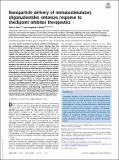Nanoparticle delivery of immunostimulatory oligonucleotides enhances response to checkpoint inhibitor therapeutics
Author(s)
Buss, Colin G; Bhatia, Sangeeta N
DownloadPublished version (1.219Mb)
Publisher Policy
Publisher Policy
Article is made available in accordance with the publisher's policy and may be subject to US copyright law. Please refer to the publisher's site for terms of use.
Terms of use
Metadata
Show full item recordAbstract
© 2020 National Academy of Sciences. All rights reserved. The recent advent of immune checkpoint inhibitor (CPI) antibodies has revolutionized many aspects of cancer therapy, but the efficacy of these breakthrough therapeutics remains limited, as many patients fail to respond for reasons that still largely evade understanding. An array of studies in human patients and animal models has demonstrated that local signaling can generate strongly immunosuppressive microenvironments within tumors, and emerging evidence suggests that delivery of immunostimulatory molecules into tumors can have therapeutic effects. Nanoparticle formulations of these cargoes offer a promising way to maximize their delivery and to enhance the efficacy of checkpoint inhibitors. We developed a modular nanoparticle system capable of encapsulating an array of immunostimulatory oligonucleotides that, in some cases, greatly increase their potency to activate inflammatory signaling within immune cells in vitro. We hypothesized that these immunostimulatory nanoparticles could suppress tumor growth by activating similar signaling in vivo, and thereby also improve responsiveness to immune checkpoint inhibitor antibody therapies. We found that our engineered nanoparticles carrying a CpG DNA ligand of TLR9 can suppress tumor growth in several animal models of various cancers, resulting in an abscopal effect on distant tumors, and improving responsiveness to anti- CTLA4 treatment with combinatorial effects after intratumoral administration. Moreover, by incorporating tumor-homing peptides, immunostimulatory nucleotide-bearing nanoparticles facilitate antitumor efficacy after systemic intravenous (i.v.) administration.
Date issued
2020Department
Harvard University--MIT Division of Health Sciences and Technology; Massachusetts Institute of Technology. Institute for Medical Engineering & Science; Koch Institute for Integrative Cancer Research at MIT; Massachusetts Institute of Technology. Department of Electrical Engineering and Computer ScienceJournal
Proceedings of the National Academy of Sciences of the United States of America
Publisher
Proceedings of the National Academy of Sciences